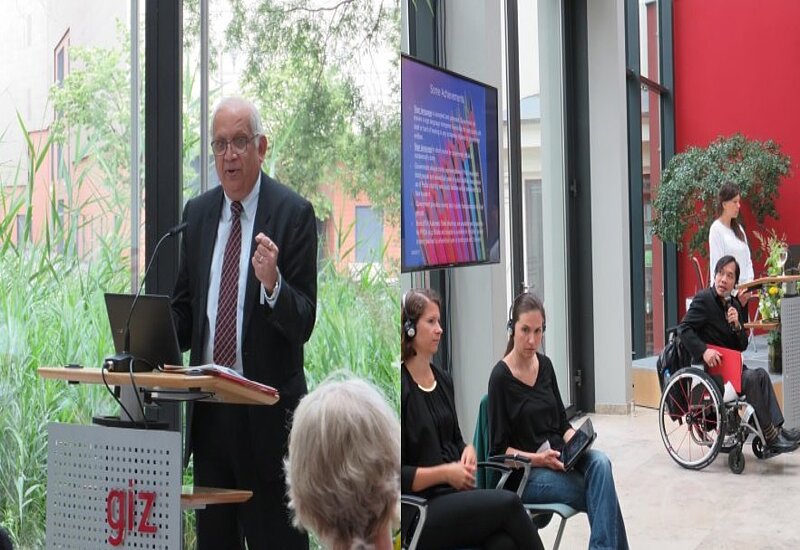- DE |
- EN
Learning from Good Practices for more inclusive cities
As part of a conference "The New Urban Agenda: Making sustainable urban development barrier-free and inclusive" that took place in Berlin on June 26th and was jointly organized by BEZEV (Behinderung und Entwicklungszusammenarbeit e.V.), Caritas international, Misereor and GIZ, Connective Cities got a chance to present its approach and experience regarding the existing urban development challenges.
In light of Agenda 2030 resolutions with its 17 Sustainable Development Goals (SDGs) as well as objectives of the New Urban Agenda, cities all over the world have been called to “leave no one behind” and work consistently on allowing inclusion of people with disabilities through a barrier-free and inclusive urban development. How can such goal be achieved? How networks could support this approach? What possibilities Germany has to promote inclusivity in cities internationally? These questions were addressed in presentations and panel discussion as well as elaborated in working groups. Good Practices from Ecuador, Brazil, Indonesia, Mexico and Germany were presented, while municipal practitioners, people with disabilities, representatives of unions and development organizations were discussing together with officials from German ministries (BMZ, BMUB) challenges and opportunities of promoting inclusion in cities.
Along with the necessity of further political anchoring of the issue of inclusivity at different levels of decision-making, the importance of knowledge sharing and information exchange on good practices was highlighted. Here, Connective Cities was able to bring its own experience and general project approach that could have a great potential in the context of inclusion. Exchange of experiences on the basis of good practices and tried-and-tested solutions enables municipal practitioners to develop new ideas suitable for their own context. As the topic of inclusion has been a cross-cutting issue for Connective Cities, it is dealt according to the chosen action strategy and current needs of urban actors.
Given particular relevance of the question of inclusion for urban mobility, during the conference Connective Cities presented an experience of awareness-raising measures used in a <link record:tx_gg_connective_cities_vd:tx_ggconnectivecities_domain_model_event:30 internen link im aktuellen>project workshop in Mexico. There, special exercises such as walking blindfold with a white cane, allowed participants experience how people with disabilities felt on streets of Toluca and in transport as well as what inconveniences they faced every day. This example demonstrated how important the objective of making cities inclusive is.
In case of a corresponding request, Connective Cities can support urban actors in their efforts to achieve greater inclusion offering its <link internal-link internen link im aktuellen>project approach of collegial advising and networking.
<link http: www.bezev.de de home agenda-2030 tagung-die-neue-urbane-agenda-nachhaltige-stadtentwicklung-barrierefrei-und-inklusiv-umsetzen _blank external-link-new-window neue urbane agenda: nachhaltige stadtentwicklung barrierefrei und inklusiv>More (German language)


